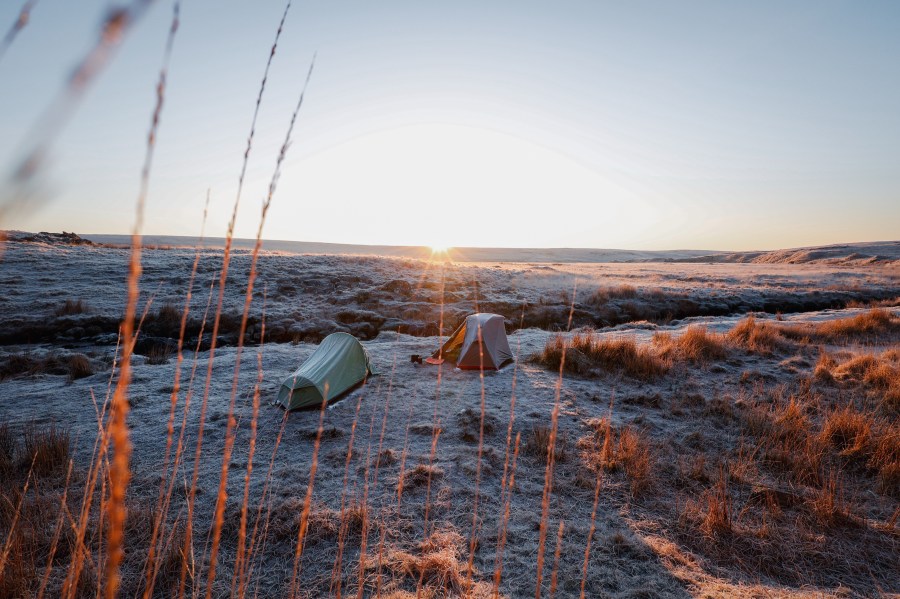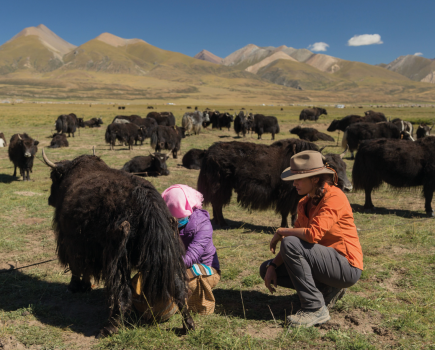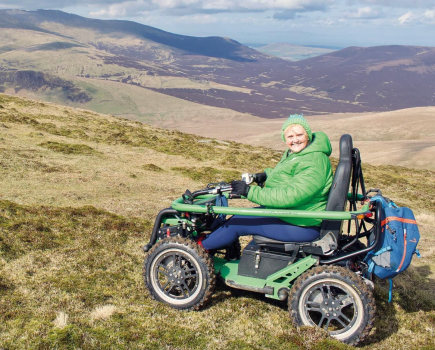Mary-Ann Ochota asks whether paid ‘wild camping’ platforms like CampWild can further the land justice revolution we so badly need as a wealthy landowner plans to return to court to remove the right to wild camp on Dartmoor.
As the Dartmoor wild camping battle rolls into the courts again, my thoughts turn to language. Dartmoor National Park Authority have asked that people call the contested activity ‘backpack camping’ rather than ‘wild camping’. The term wild camping is being muddied, they say, used to describe people pitching on inappropriate sites near roads and leaving a mess. ‘Backpack camping’ does a better job of describing what the activity actually is – carrying everything in and out yourself, and using a small and unobtrusive tent to ensure minimal impact on nature and other people.
Main image: The sun rises over a perfect Dartmoor wild camp | Credit: David Guest
We don’t have an agreed term for the bad kind of camping – ‘Fly Camping’ sounds a bit cool, unconstrained by boring rules. ‘Dirty Camping’ isn’t much better. Maybe we shouldn’t even award it a name, and simply say, ‘Er, no. that’s not camping, that’s littering and criminal damage.’
I don’t think it was an accident that the landowners trying to prevent wild camping on Dartmoor – and the media outlets sympathetic to their braying – used the term to describe instances of littering and antisocial behaviour. Muddy the definitions and you seed the idea that everyone accessing the moor might cause harm with their dubious recreational activities. It then seems reasonable that landowners need to protect nature from these hordes of would-be fire-starting, litter-dropping, tree-chopping ne’er do wells. Language is a powerful tool.
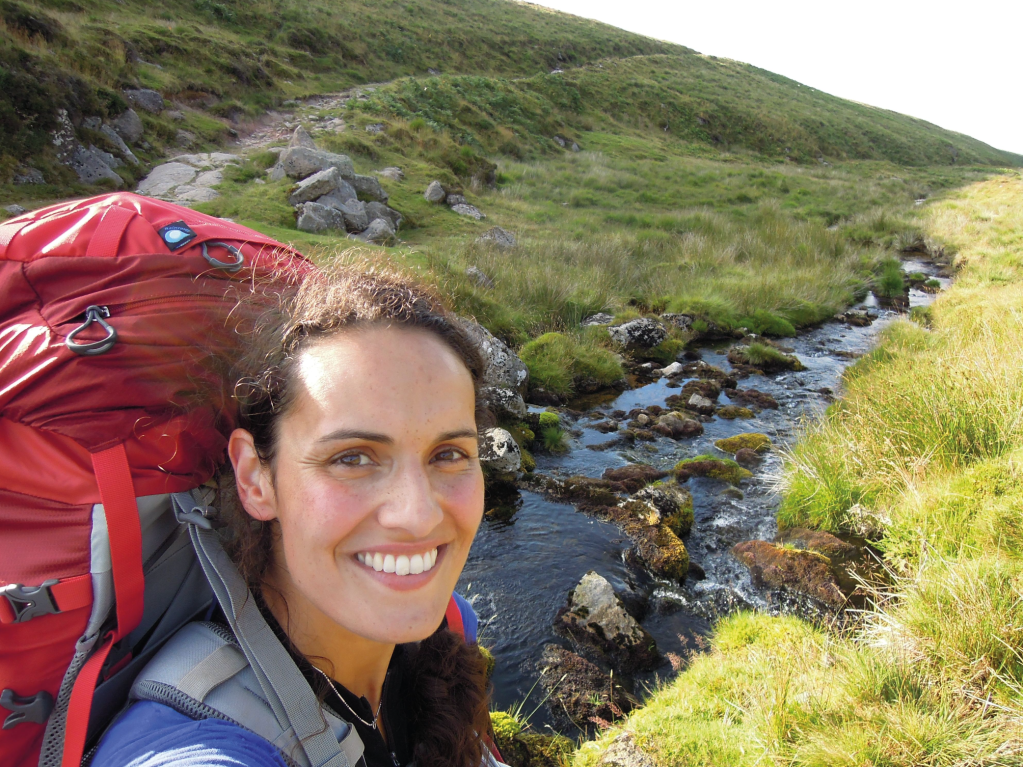
Mary-Ann Ochota backpacking in her element. Credit: Mary-Ann Ochota
So, while Wild, er, Backpack Camping has a showdown in the Supreme Court, another debate brews. Is it ‘wild’ if landowners charge people to camp on their land?
There’s the ‘Almost Wild’ campsite guide, and the ‘Nearly Wild Camping Directory’. And there’s a newcomer on the block, CampWild. They’re bolder with the language, claiming to be a ‘wild camping platform’ and working with ‘land custodians’ to ‘unlock a network of spaces in nature’. Pay for your pitch and you can head ‘behind private gates, into lands unexplored, nature unspoilt…hidden away for generations and only now unlocked for camping, adventure and reconnection to nature.’
I don’t suppose it’s what the CampWild founders intended, but their language doubles down my certainty that we urgently need a land justice revolution in this country. Unlock those private gates and give me access to nature, yes. But not because I’m paying for the privilege – because access to nature and land is my right, as a citizen.
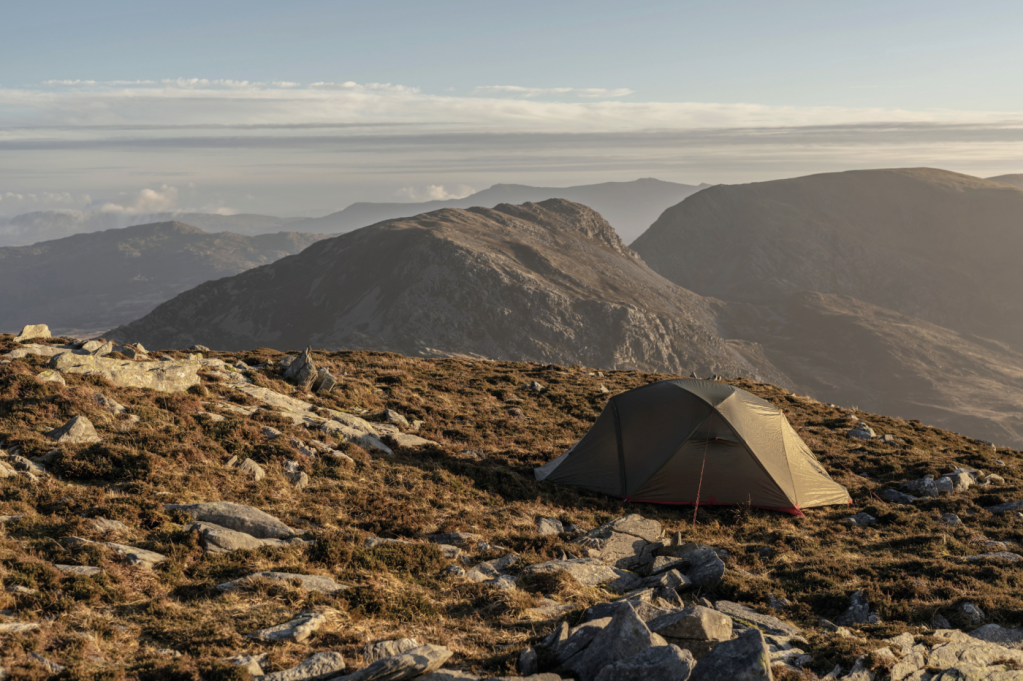
Wild camping in the Rhinogydd on the Cambrian Way. Credit: Shutterstock
But until we achieve the land rights revolution in law, do these wild/wilder/almost wild camping providers have a role to play? I’ve spent plenty of nights wild camping in the hills and also in lowland spots – once, memorably, under a hedge in Surrey. On my own, arriving late and leaving early, using a bivvy bag rather than a tent, I can usually get away with it, undisturbed. But ‘usually tolerated but technically trespassing camping’ can be stressful.
If I’m with my two young kids, I want more certainty. Something as close to wild camping as possible (I don’t want shower blocks and mown lawns), but where we can make camp at 2pm and womble off at 10am, secure in the knowledge that no-one’s going to tell us to leave, that would be great.
Building a new type of relationship between the public and land managers requires trust – and this again, is where these wild-ish camping platforms might add value. Landowners worry about who is on their land and what they’re up to – these platforms reassure them that we’re not fire-starting, litter-dropping, tree-chopping ne’er do wells. And if there is a problem, they have a management authority (the camping company) who they can raise the issue with.

A Kinder Low wild camp above the Edale valley. Credit: Francesca Donovan
Over time, a growing network of land managers will trust campers to do what they promise – leave no trace, follow instructions about campfire and waste management, and act responsibly. Seeing is believing. They’ll influence other landowners that actually, wild campers aren’t bad or dangerous, and can be trusted. That growing baseline of trust and familiarity gives us scope to move the conversation on.
Access to camping, adventure and reconnection to nature shouldn’t require a booking platform and paywall of course – money for responsible public access should come from the public purse, it should be a ‘public good’ on a par with habitat restoration and sustainable agriculture. But while the law in England and Wales is as it is, this is an imperfect but practical interim.
Language does matter. But let’s set our sights on the bigger prize – a transformation of land access rights, everywhere, for everyone. And to achieve that, we need land manager allies – ones that we might, perhaps, find on those booking platforms.
Mary-Ann is a broadcaster, anthropologist and hillwalking ambassador for the British Mountaineering Council. Find her @maryannochota.

